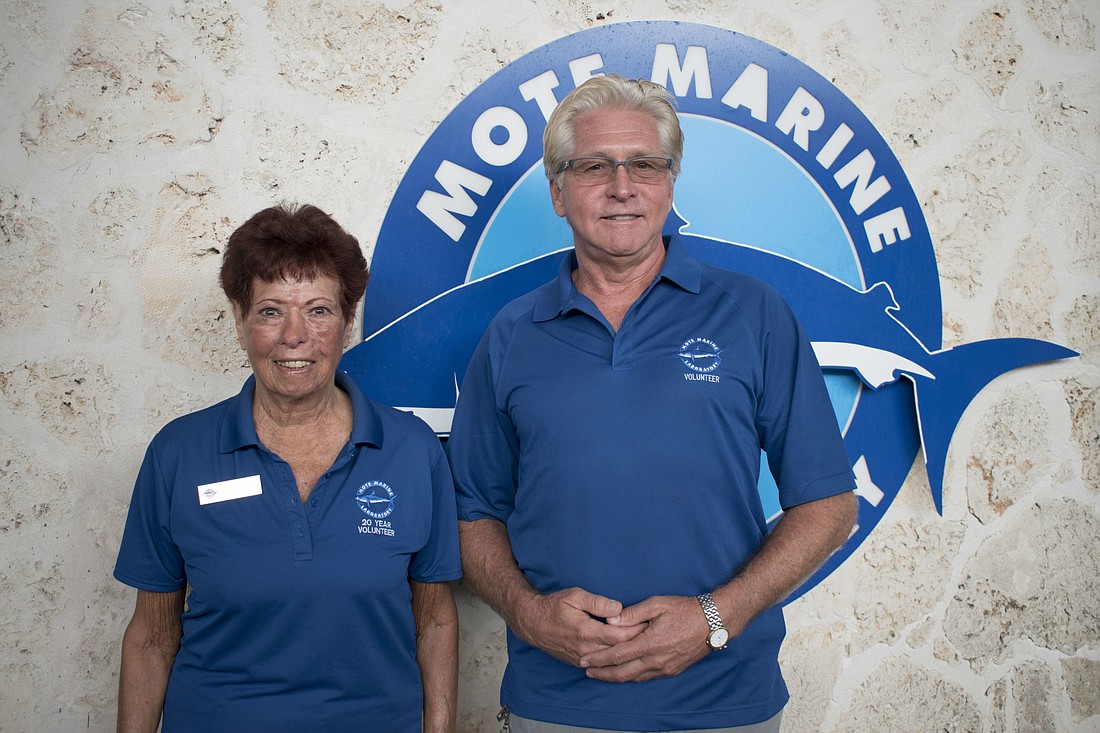- November 17, 2024
-
-
Loading

Loading

Don’t tell Gwen Ross the green moray eel at Mote Marine Laboratory and Aquarium is ugly.
“I’m a champion of the underdog,” she said. “So, the ‘ugly’ moray is my favorite, because I defend him.”
The moray eel is not even green.
“No, his body is blue, and he’s covered in yellow slime and nature provides that so he can slither in and out of small spaces without getting hurt,” she said. “When they [Mote visitors] hear that, then they become interested. He’s not ugly anymore. He’s an animal of interest, so that’s why I think he’s my favorite.”
For the past 20 years, Ross, a Longboat Key resident, has been slowly filling her mind with these animal facts. After moving to Longboat from Long Island, Ross was looking for ways to get involved.
Her background is in finance, and her position in New York was intense. When she moved, she was bereft of things to do.
“I mean, look at this weather. Am I going to be cooped up and be on the computer? Forget it,” she said.
So, she went to Mote and signed up for volunteer training.
Her story isn’t uncommon. Many of Mote’s volunteers come from Longboat Key, but not all of them thought Mote would be their volunteer home.
Because of her background in journalism and arts administration, Louise Claussen thought she would become involved at the John and Mable Ringling Museum of Art.
After attending a volunteer-interest gathering at Mote, she was hooked.
Likewise, Frank Puett moved to Longboat less than two years ago. He visited Mote and assumed it was just an aquarium.
But then he signed up to volunteer and realized how much more there was to Sarasota’s aquarium. He didn’t know scientists were working in the laboratory to replenish coral reefs or researching sharks and eels.
For Claussen, that’s what makes Mote the institution that it is.
“One of the things that I do love about it is that it is a research facility, and it’s not just a tourist attraction or animal display area,” she said. “It really has a very important mission, and I think that’s so important.”
Without backgrounds in marine science, Ross, Puett and Claussen have caught on quickly to the marine way. After their interviews, Mote staff trains volunteers before sending them out into the marine-enthused chaos.
“You really don’t have to have any kind of background in the marine sciences,” Claussen said. “You just have to have an interest.”
Training has changed over the years. When Ross went through training, she had to take an open book test before shadowing a veteran volunteer for six weeks. While today’s new volunteers do shadow veteran volunteers, the test is no longer a prerequisite. Puett, who most recently went through training, was given a packet of information on fish, animals and exhibits following his interview. Volunteers also get emails throughout the week with updates.
But their training never really ends.
At the beginning of each shift, volunteers watch a short presentation where they learn something new about one of the animals or get updates on new exhibits. After that, the docents head out to their assigned stations. They spend 30 minutes at an exhibit before rotating with a fellow docent.
But don’t let that routine fool you. Mote’s volunteer experience is diverse, including cashiers, greeters, member specialists, education assistants, fisheries assistants or animal husbandry volunteers. Some don’t even work at Mote. They travel with the Mote Mobile Exhibit and the Sarasota Bay Explorer tour guides.
“When I first went to find out about volunteering, I thought I would be doing something behind the scenes, like proofreading newsletters, but when it came around to doing the interview, I caught myself wanting to be a guide for the visitors,” Claussen said.
But it’s not just the information that keeps the docents invested. Being with the visitors is what’s so rewarding, the three docents said. During their shifts, the docents share animal facts and some of Mote’s history with visitors.
On a recent shift, Puett met a teenage girl who was hoping to major in marine biology. For Puett, the opportunity to encourage someone’s passion is a privilege.
“I just love the environment,” Puett said. “I hope that I will never get tired of it. But, I also enjoy interacting with people, seeing the excitement that they have for what’s going on here, and they share that with me. It’s a very enjoyable experience.”
Whether it be swapping animal facts with Mote’s youngest patrons or informing parents that a portion of their admission goes back to research, the docents thrive off hearing how much families enjoy Mote.
“When I hear that, that’s my payment, and that’s why I can’t let go,” Ross said. “I just keep coming back.”